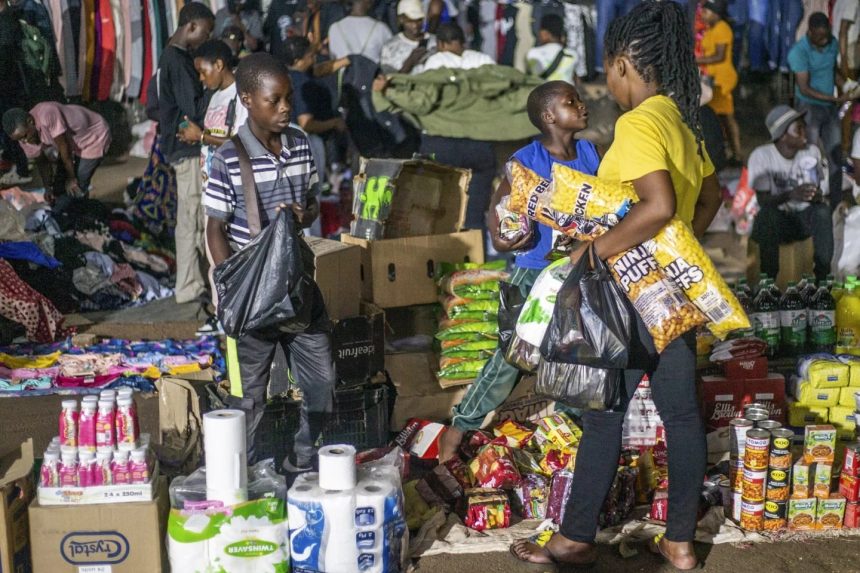HARARE, Zimbabwe (AP) — Batsirai Pabwe carefully selected detergents, toothpaste, snacks, and pasta from a makeshift display spread across the tarmac of a car park. This was no ordinary grocery store; it was an unorthodox night bazaar in Zimbabwe’s capital, Harare, illuminated by the flickering glow of cell phone flashlights and fluorescent lamps.
Traditional stores are struggling to survive as the volatility of Zimbabwe’s new currency, the ZiG, drives prices skyward. Many consumers, like Pabwe, are now turning to these much cheaper informal markets, which operate under the cover of night to evade authorities.
As dusk settles, sidewalks, store verandas, and parking spaces transform into bustling open-air bazaars, offering a diverse range of goods, from groceries and fresh meat to electronics, clothing, medicines, fashion accessories, and stationery.
Free from the constraints of rising energy costs, taxes, and regulations that force formal retailers to accept the local currency at artificially low official exchange rates, informal traders, including children, offer significantly better deals. A box of juice that retails for $3 in a supermarket can be purchased for half that price on the street.
“It’s my first time shopping here. My friend told me that it’s much cheaper than the supermarkets,” said Pabwe, a 30-year-old resident, visibly relieved as he filled a plastic bag with his purchases for just $20. “I decided to give it a try, and I really enjoyed it.”
Pabwe recounted that a week prior, he had spent the same amount at a supermarket and only managed to purchase “meat and spices, and even then, it wasn’t a significant quantity.”
In April, this southern African nation of 15 million people, once a prosperous economy, introduced the ZiG, a new gold-backed currency, to replace its rapidly depreciating predecessor. This marked the country’s sixth attempt at a new currency since the devastating hyperinflation of 2009, which reached a staggering 5 billion percent, forcing the nation to abandon its own currency and adopt the U.S. dollar as legal tender. The U.S. dollar has since remained legal tender alongside successive local currencies.
The launch of the ZiG was accompanied by a media blitz, with catchy jingles and songs playing repeatedly on radio, television, and online.
However, seven months later, the ZiG appears to be following in the footsteps of its predecessors, struggling to maintain its value. The gap between the official and black market exchange rates continues to widen, leading many individuals and informal traders, who dominate the economy, to favor the more stable U.S. dollar.
Traditional stores, compelled by authorities to charge in the local currency, are compelled to increase prices to remain viable. However, they have become increasingly uncompetitive compared to the unregulated informal markets, according to the Retailers Association of Zimbabwe, an industry representative group.
The association warned of potential store closures, stating that the current situation is “clearly untenable.”
In October, Pick n Pay, a major African grocery chain with over 70 stores in Zimbabwe, announced that it had “impaired” its investment in the country “to a book value of zero” due to the “deteriorating economic conditions.”
“In every transaction, businesses operating within the formal sector are incurring exchange rate losses that cannot be recouped. The primary issue here is a currency crisis,” explained Gift Mugano, an economics professor. The significant overhead costs further exacerbate the challenges faced by retailers.
“Everything is stacked against their survival. The informal sector operates at night, and if there is no electricity, they simply use their phones. They are unconcerned with these issues; their primary focus is survival,” Mugano added.
The stark contrast between the formal and informal sectors is evident in Harare’s Central Business District. On a recent day, a handful of shoppers cautiously surveyed the prices within a supermarket.
Soothing music played softly within the store, but it was easily drowned out by the vibrant energy outside, where hordes of street vendors enthusiastically called out their bargains to a sea of eager shoppers.
“Business is booming,” declared Oswald Gari, a vendor, revealing that he only operates at night when the police are less likely to intervene.
Gari, 51, explained that he relies on his night trade to support his six children and four nephews. Finding formal employment in a country where once-thriving industrial sites are now being converted into vast warehouses for imported goods, many of which ultimately end up on the streets, and railway tracks are overgrown with weeds, is a distant hope.
According to official figures and the International Labor Organization, over 80% of Zimbabwe’s employable population relies on the informal sector for their livelihood.
For Pabwe, shopping at the informal night markets offers a more convenient and less stressful experience.
“It’s quite confusing, especially for people like me who don’t fully understand the value of the ZiG. Navigating supermarkets can be quite overwhelming,” he admitted.
He expressed satisfaction with his shopping experience at the night bazaar.
“I found everything I was looking for, and the prices were incredibly affordable. I was able to purchase a significant amount of goods for just $20. I even managed to get my washing powder and dishwashing liquid,” he said. “I believe I will be shopping here more frequently.”




















